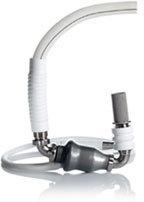
June 30, 2011 — Results of a clinical research study at Sharp Memorial Hospital indicate that patients 70 years of age or older have good functional recovery,survival and quality of life at two years when undergoing left ventricular assist device (LVAD) therapy for heart failure. The study was released in the June 21 edition of the Journal of the American College of Cardiology.
The study's lead author, Robert M. Adamson, M.D., medical director of the cardiac transplantation program at Sharp Memorial, and colleagues concluded that LVAD therapy should be considered an "attractive option" for some patients, and that advanced age alone should not determine whether or not a patient receives LVAD support. The research team also noted "very good results can be achieved in a community hospital setting with a focused effort from a dedicated team."
Patients in the study were implanted with Thoratec's HeartMate II LVAD, which received U.S. Food and Drug Administration (FDA) approval for bridge to transplantation therapy in April 2008 and for destination therapy in January 2010 for transplant-ineligible heart-failure patients. At Sharp Memorial, which serves as a Thoratec training site, the transplant team has implanted nearly 130 HeartMate II devices. The physicians and staff there have been working together since the 1980s and performed San Diego's first heart transplant in 1985. Since then, the team has performed more than 340 heart transplants and numerous implant procedures. They also have the longest LVAD-supported patient in the world, who first received the device more than nine years ago in March 2002.
"With an increasing population of elderly patients with advanced heart failure who have limited treatment options, the FDA's approval of LVAD therapy make sense for many individuals," said Adamson. "Older patients in the study were very appreciative of the improved quality of life afforded by LVAD therapy. While younger patients want to live longer, older patients want to live better."
During the research period, 55 patients received the HeartMate II between Oct. 5, 2005, and Jan. 1, 2010, as part of either bridge to transplantation or destination therapy trials. Patients were separated into two age groups: 70 years of age or younger (30 patients) and older than 70 years of age (25 patients). Pre-operatively, all patients were classified as having severe heart failure, showing symptoms of cardiac insufficiency at rest (New York Heart Association Class IV). The research team compared outcome measures between the two groups including survival, length of hospital stay, adverse events and quality of life.
The survival rate between the two groups was not statistically different. For patients older than 70, the survival rate was 97 percent at one month, 75 percent at one year and 70 percent at two years. For patients 70 and younger, the rate was 96 percent at one month, 72 percent at one year and 65 percent at two years.
The average length of hospital stay for the older group was 24 days, which was similar to length of stay for the younger group (23 days). The researchers found no differences in the incidence of adverse events between the two groups, and quality of life and functional status improved significantly in both groups.
Co-authors of the study at Sharp Memorial include Marcia Stahovich, RN; Suzanne Chillcott, BSN; Sam Baradarian, M.D.; Joseph Chammas, M.D.; Brian Jaski, M.D.; Peter Hoagland, M.D. and Walter Dembitsky, M.D.
For more information: www.sharp.com/memorial


 January 05, 2026
January 05, 2026 









